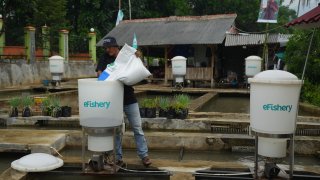
A worker refills a robotic dispenser by eFishery, an agritech startup, at a fish farm in Subang Regency in West Java, Indonesia, in June 2022. The startup helps farmers optimize their processes through automatic feeders and mobile apps.
- Investors and startups CNBC spoke to said that Indonesia has huge potential for seafood farming, but it's not realizing its full potential.
- "Indonesia's fisheries industry has a lot of old-style players that have passed on conventional business practices from generation to generation," said Yinglan Tan, founding managing partner and CEO of Singapore-based Insignia Ventures Partners.
- Last year, several startups raised millions of dollars from big name investors to fill that gap, including eFishery, Aruna, Delos and FishLog.
Indonesia's tech startups are reeling in big money in seafood farming. That shouldn't come as a surprise — the archipelago is home to one of the world's longest coastlines and over 18,000 islands and islets.
Watch NBC6 free wherever you are
But there's another reason: A "technology gap" is holding the industry back from realizing its vast potential, according to investors and startups that CNBC spoke to.
Last year, several startups raised millions of dollars from big name investors to fill that gap: eFishery ($90 million in Series C), Aruna ($30 million in follow-on Series A), Delos ($8 million in seed extension) and FishLog ($3.5 million in pre-Series A).
Get local news you need to know to start your day with NBC 6's News Headlines newsletter.
"Indonesia is the second largest wild catch producer in the world after China. And we are third in aquaculture production after China and India. But if we talk about exports in terms of value, we are only 12th place in the world," said Farid Naufal Aslam, co-founder and CEO of Aruna, a fisheries e-commerce startup. Aquaculture is the controlled cultivation of aquatic organisms such as fish and shellfish, especially for human consumption.
"A lot of decisions made are based on gut feeling or what ancestors have been doing for the past 60 years," said Guntur Mallarangeng, co-founder and CEO of shrimp farm management company Delos.
And he's not alone in thinking that.
Money Report
"Indonesia's fisheries industry has a lot of old-style players that have passed on conventional business practices from generation to generation," said Yinglan Tan, founding managing partner and CEO of Singapore-based Insignia Ventures Partners, which invested in FishLog.
Helping farmers 'grow'
Those in Indonesia's fisheries industry need more efficient technology and better processes, according to Tan.
"The only way that the industry can grow is when the farmers grow. If the farmers don't grow and expand their businesses, we can't really produce more fish," said Gibran Huzaifah Amsi El Farizy, founder and CEO of eFishery, an aquatech startup.
eFishery helps farmers optimize their processes through automatic feeders and mobile apps. The automatic feeders detect the hunger levels of fish and shrimp through their movements, which prevents a problem more common in the manual process: over- and under-feeding.
Farizy started his own catfish pond in 2009 while he was a student to supplement his family's income. By the time he graduated, he was managing 76 ponds, and started exploring how he could use tech to help farmers.
He then built the prototype for the automatic feeder in 2012 and launched it in 2013.
"The feeding costs consist of 70%-90% of the total costs. So [automatic feeding] can increase the productivity and reduce the costs," Farizy said. He claimed that the automatic feeders can reduce the feeding costs by 28%.
Aruna, for its part, helps to connect Indonesia's small-scale fishers to buyers. It claims it works with 40,000 fisherman across 170 locations.
Small-scale fisheries make up about 90% of the total number of fishers, according to the Marine Policy journal of ocean policy studies.
"In terms of productivity and efficiency, they are still very traditional," Aslam said.
He claimed that farmers who worked with Aruna have been able to sell their catch by up to 50% more. And according to a report by the Centre for Impact Investing and Practices, Singapore Management University and Accenture, fishermen have achieved a three- to 12-fold increase in income through Aruna.
"Farmers will produce what the market needs. It makes the supply chain more efficient, and increases the income of the fishermen because they know the type of fish they have to catch and what they can sell at a higher price," Aslam said.
Potential to be a global leader
Though the country utilizes only 7.38% of its total potential area for aquaculture, it already ranks among the most productive countries in aquaculture production, according to a 2016 report by market research firm Ipsos.
"With the right transfer of knowledge and technology of best aquaculture practices, Indonesia is very well positioned to consolidate its standing as one of the top aquaculture nations in the world," the report said.
Aakash Kapoor, vice president at Sequoia Southeast Asia — which invested in eFishery — is also "bullish" on the industry.
"Indonesia being one of the largest exporters of fish and shrimp in the world is arguably a higher margin opportunity. And the government is also supportive towards Indonesia becoming an export economy in many sectors including aquaculture," he said.
"Indonesia has the puzzle pieces to become a global leader in aquaculture and seafood production. Once we figure out how to put them together, we should be able to become a seafood powerhouse in the global market," said Delos' Mallarangeng.






